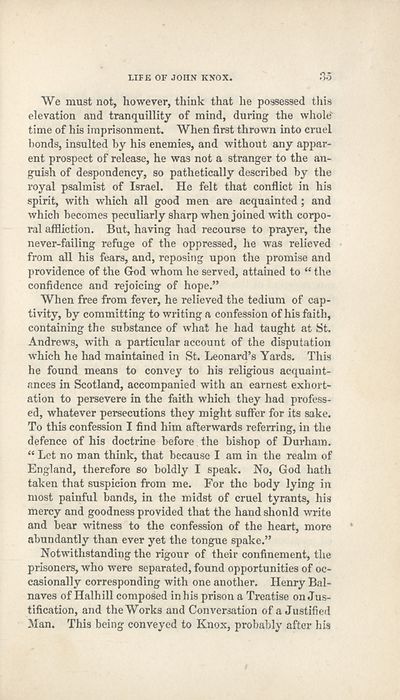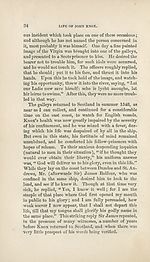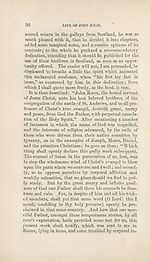Download files
Complete book:
Individual page:
Thumbnail gallery: Grid view | List view

LIFE OF JOHN KNOX.
We must not, however, think that he possessed this
elevation and tranquillity of mind, during the whole'
time of his imprisonment. When first thrown into cruel
bonds, insulted by his enemies, and without any appar¬
ent prospect of release, he was not a stranger to the an¬
guish of despondency, so pathetically described by the
royal psalmist of Israel. He felt that conflict in his
spirit, with which all good men are acquainted ; and
which becomes peculiarly sharp when joined with corpo¬
ral affliction. But, having had recourse to prayer, the
never-failing refuge of the oppressed, he was relieved
from all his fears, and, reposing upon the promise and
providence of the God whom he served, attained to “ the
confidence and rejoicing of hope.”
When free from fever, he relieved the tedium of cap¬
tivity, by committing to writing a confession of his faith,
containing the substance of what he had taught at St.
Andrews, with a particular account of the disputation
which he had maintained in St. Leonard’s Yards. This
he found means to convey to his religious acquaint¬
ances in Scotland, accompanied with an earnest exhort¬
ation to persevere in the faith which they had profess¬
ed, whatever persecutions they might suffer for its sake.
To this confession I find him afterwards referring, in the
defence of his doctrine before the bishop of Durham.
“ Let no man think, that because I am in the realm of
England, therefore so boldly I speak. No, God hath
taken that suspicion from me. For the body lying in
most painful bands, in the midst of cruel tyrants, his
mercy and goodness provided that the hand should write
and bear witness to the confession of the heart, more
abundantly than ever yet the tongue spake.”
Notwithstanding the rigour of their confinement, the
prisoners, who were separated, found opportunities of oc¬
casionally corresponding with one another. Henry Bal-
naves of Halhill composed in his prison a Treatise on Jus¬
tification, and the Works and Conversation of a Justified
Man. This being conveyed to Knox, probably after his
We must not, however, think that he possessed this
elevation and tranquillity of mind, during the whole'
time of his imprisonment. When first thrown into cruel
bonds, insulted by his enemies, and without any appar¬
ent prospect of release, he was not a stranger to the an¬
guish of despondency, so pathetically described by the
royal psalmist of Israel. He felt that conflict in his
spirit, with which all good men are acquainted ; and
which becomes peculiarly sharp when joined with corpo¬
ral affliction. But, having had recourse to prayer, the
never-failing refuge of the oppressed, he was relieved
from all his fears, and, reposing upon the promise and
providence of the God whom he served, attained to “ the
confidence and rejoicing of hope.”
When free from fever, he relieved the tedium of cap¬
tivity, by committing to writing a confession of his faith,
containing the substance of what he had taught at St.
Andrews, with a particular account of the disputation
which he had maintained in St. Leonard’s Yards. This
he found means to convey to his religious acquaint¬
ances in Scotland, accompanied with an earnest exhort¬
ation to persevere in the faith which they had profess¬
ed, whatever persecutions they might suffer for its sake.
To this confession I find him afterwards referring, in the
defence of his doctrine before the bishop of Durham.
“ Let no man think, that because I am in the realm of
England, therefore so boldly I speak. No, God hath
taken that suspicion from me. For the body lying in
most painful bands, in the midst of cruel tyrants, his
mercy and goodness provided that the hand should write
and bear witness to the confession of the heart, more
abundantly than ever yet the tongue spake.”
Notwithstanding the rigour of their confinement, the
prisoners, who were separated, found opportunities of oc¬
casionally corresponding with one another. Henry Bal-
naves of Halhill composed in his prison a Treatise on Jus¬
tification, and the Works and Conversation of a Justified
Man. This being conveyed to Knox, probably after his
Set display mode to:
![]() Universal Viewer |
Universal Viewer | ![]() Mirador |
Large image | Transcription
Mirador |
Large image | Transcription
| Antiquarian books of Scotland > Scotland/Scots > Life of John Knox ; and, The life of Alexander Henderson > (53) |
|---|
| Permanent URL | https://digital.nls.uk/131832940 |
|---|
| Description | Thousands of printed books from the Antiquarian Books of Scotland collection which dates from 1641 to the 1980s. The collection consists of 14,800 books which were published in Scotland or have a Scottish connection, e.g. through the author, printer or owner. Subjects covered include sport, education, diseases, adventure, occupations, Jacobites, politics and religion. Among the 29 languages represented are English, Gaelic, Italian, French, Russian and Swedish. |
|---|

